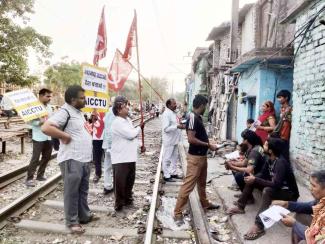Delhi witnessed an unprecedented situation in the lead-up to the election. Its elected Chief Minister was arrested under dubious charges. The seat-sharing arrangement had been announced by then but Arvind Kejriwal’s arrest generated a strong groundswell of opinion against the BJP government.
There were other reasons too for the brewing discontent among the masses of Delhi against the BJP: unemployment, price rise, demolitions and evictions, systematic communal polarization, memories of demonetization and the covid deaths and so on.
The Aam Aadmi Party (AAP) and the Congress joined hands to campaign, and it seemed that the seat-sharing arrangement, along with the mass dissatisfaction against the BJP, would defeat the Bharatiya Janata Party (BJP). In the end, BJP won all 7 seats but in each seat the victory margin was significantly lower compared to 2019. BJP’s vote share fell from 57% in 2019 to 54.4% in 2024.
In three seats BJP’s victory margin was less than 1 lakh: Chandni Chowk (89,325 in 2024; 2,28,145 in 2019), East Delhi (93,663 in 2024; 3,91,222 in 2019) and New Delhi (78,370 in 2024; 2,56,504 in 2019). In North-East Delhi (1,38,778 IN 2024; 3,66,102 in 2019) and South Delhi (1,24,333 in 2024; 3,67,043 in 2019) the victory margin was between 1 and 1.5 lakhs. The margin was more substantial in West Delhi (1,99,013 in 2024; 5,78,586 in 2019) and North-West Delhi (2,90,849 in 2024; 5,53,897 in 2019), but still it was far lower than the 2019 margin.
The results suggest that with better efforts the results could have been reversed. Perhaps a more coordinated campaign was necessary. It seems that not enough was done to tell the average voter about the alliance, let alone convincing them to vote for it. While the top leaders of the Congress and AAP did work in coordination, such coordination was lacking at the middle and lower levels.
Unfortunately, the INDIA leaders did little to bring on board non-AAP, non-Congress parties within INDIA, which have a presence in various areas. The combined presence of trade unions, the Left parties, Ambedkarite groups, civil society organizations, does amount to something but the alliance leaders failed to tap into that strength. This also resulted in weak booth management and polling-day presence in critical areas. All these culminated in the failure to convert peoples’ anger against the BJP into a favorable result for INDIA.
The non-Congress, non-AAP forces within INDIA ran parallel campaigns, integrating common citizens and civil society organizations with them. CPIML lead one such campaign: the Vote for INDIA campaign in South Delhi, which touched upon most Assembly Constituencies in South Delhi. The All-India Central Council of Trade Unions (AICCTU) campaigned extensively in three major industrial areas: Narela, Wazirpur and Okhla. Students of the All-India Students Association (AISA) joined both campaigns from time to time and campaigned in the vicinity of their universities on most other days.
During the campaign, veteran trade union leader and CPIML South Delhi District Secretary Comrade Ajay Pal Singh urged people to remember each and every damage caused by the Modi government and vote them out. Trying to break the Modi-spell, CPIML State Committee member Akash Bhattacharya repeatedly pointed out that it was the people who had voted BJP to power and the people had the power to vote him out as well.
At a campaign meeting in Kusumpur Pahadi, Jawaharlal Nehru Students’ Union (JNUSU) President Comrade Dhananjay emphasized that INDIA is primarily an alliance of the people rather than of political parties and people must vote for it. In the same meeting Central Committee member Comrade Sucheta De asked the workers to vote for their rights and for their future.
The AICCTU campaign, spearheaded by Comrades Abhishek (Delhi General Secretary), Surya Prakash (Delhi Secretary), Apurva Sharma (President, App Karmachari Ekta Union) and others, gave the slogan Modi Hatao Mazdoor Bachao. The campaign emphasized on the anti-worker and pro-corporate nature of the Modi government and urged the workers to vote in large numbers against it. AICCTU also submitted a workers’ charter of demands to the INDIA candidates it campaigned for.
In a state beleaguered by a pogrom, a pandemic, demolitions, segregation and polarization, the election campaign generated fresh energy and created new solidarities on the ground. While the AAP-Congress alliance may be tested in the times to come, the people who invested hope in INDIA will remain active in their efforts to rid Delhi of the communal-corporate influence of the BJP.











